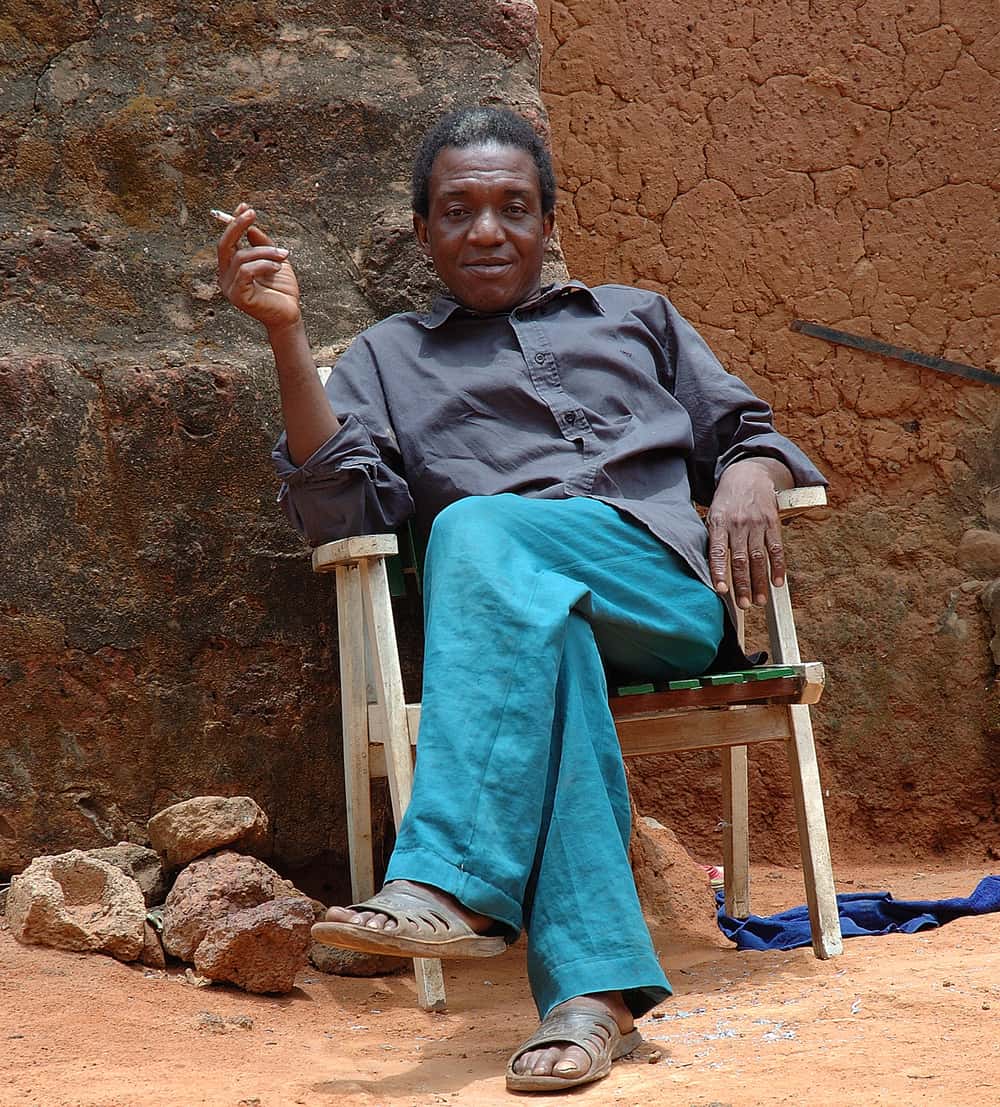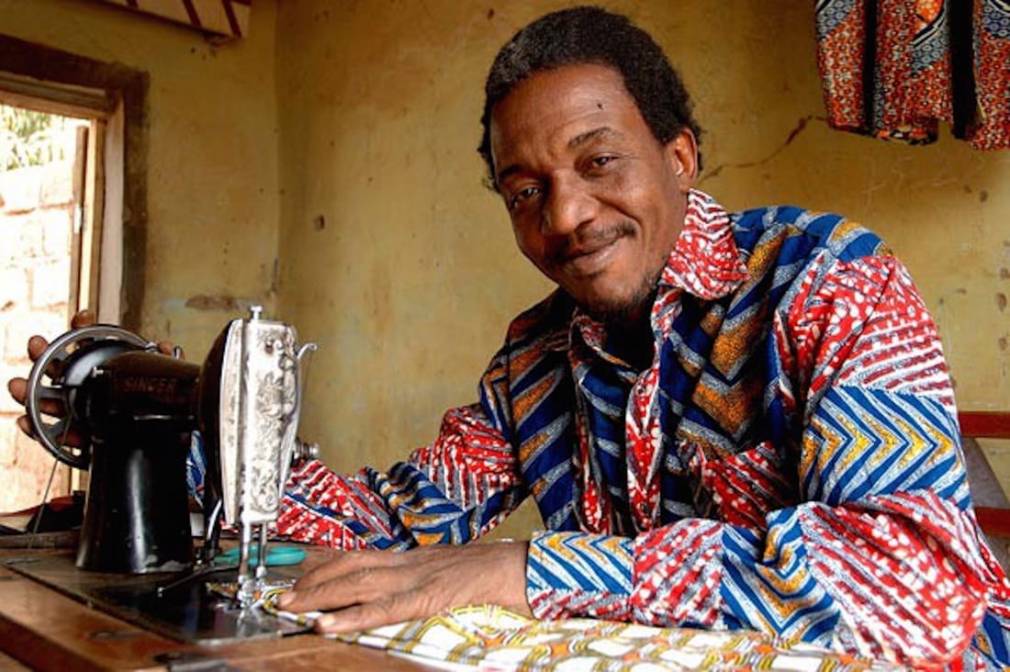Ten years on from the album’s initial release, Heavenly Sweetness have reissued a vinyl release of the record that turned the late Burkinabé singer famous, who passed away five years ago.
2008. The year the Burkinabé singer Victor Démé released his debut solo album and was placed on all the international stages. It is as if the musician finally got revenge on the years of hassle he had to go through and the battles he had to fight – even against his own family – to eventually dedicate himself entirely to music.
That same year, we met in Ouagadougou, inside the Ouagajungle studio where the infamous album, Victor Démé, was recorded. At the time he was about to fly out to perform his first concert in France, a country where the radio played his track “Djon Maya” on heavy rotation. He couldn’t believe it. Especially when looking back on his past, and remembering the twisted paths that his journey through life had paved for him.
Démé, as he was known, was born in 1962 in Bobo-Dioulasso, two years after the independence of Upper-Volta, now Burkina Faso. At a very young age, he followed his parents to Abidjan where his father settled down as a tailor-embroiderer and expected to see his son take the business over from him. Which is why he chose to keep his son next to him in the workshop, sitting at the sewing machine, rather than sending him to school. However, each summer he would spend holidays at his grandparents’ in Upper-Volta, and very much enjoyed spending time with his griot-grandmother who would always sing.
“My grandmother would dress brides, do their make up and braid their hair. And the whole time doing this she would sing songs to the bride. Something like: ‘You are going to enter another family, and walk with the cadence of this family. You are not a free woman anymore.’ She was always singing, even while doing the laundry, and I would hear sounds that made me travel… That’s why I always wanted to be next to her.” Back in Abidjan, Démé would slip out of the workshop more and more often to follow musicians, and in particular Abdoulaye Diabaté, who hired him as a backing vocalist in his band Super Mandé. They participated in the famous TV show Podium hosted by Fulgence Kassy. Against his father’s advice, he had just started a career in music.

“I chose music, and it got me in so much trouble. According to Muslim religion, they say that God does not like chants, and some griots gave up singing just because of this. I spent five years without playing music. Then I came to understand that God did actually love music, so I said to myself, ‘don’t wait any longer!’“
There’s one thing Démé is convinced of: music helps people to live better.
“If a kid is a delinquent, just send them to music school, as it will change their ways of thinking and calm them down. Music takes you to another planet where there is no wickedness, where you don’t think about death, where you forget all that is bad. And even my own family, who told me ‘don’t ever sing’, they themselves sing to worship God. In the mosque you have to sing, in the church you have to sing, so that you can worship God. But that’s what God asks from us… without music, the world would go mad.”
A few years later, having played in orchestras in Bouaké (Ivory Coast) and Bobo-Dioulasso (in Upper-Volta, now Burkina), he returned indefinitely and settled in the capital, where he joined the Supremes Kombemba, a band regularly awarded – notably, twice, for the National Cultural Week prize. Solo, he even went on to win a contest organized by a cigarette brand. This is the moment when he thought his time had finally come!
The prize consisted of a plane ticket to France, or a moped. Démé, well-grounded, chose the moped. But the cigarette company that had promised to develop the career of the awarded candidate eventually let him down. Now alone with just his bike, it was like starting from scratch. He would go through the ’90s and mid-2000s performing solo in cabarets, with a guitar that he often had to borrow, to earn peanuts: they would often pay his performances in alcohol – two “balls” of Pastis (anise-flavored spirit), a calabash of tchapalo (millet beer), and more rarely, two or three hundred CFA Francs [approximately only 38 € cents, 35 £ pence, 45 $ cents].
“I was about to become an alcoholic tramp. I would drink a lot in the cabarets, but I always came home with 1.000 or 1.500 CFA Francs [approximately 1.90 €, £ 1.75, $ 2.26].”
Therefore, people saw him as a good-for-nothing musician unable to earn enough to survive. Incidentally, as a nod to these troublesome times, the Victor Démé album recently reissued on vinyl by Heavenly Sweetness, begins with an introductory track in which you can hear the women who live next to the singer tell him: “You are annoying us with your guitar!”Actually, let’s talk about the album a bit now, which was recorded thanks to Démé’s meeting with Paris-based Radio Nova journalist David Comeillas and the young French sound engineer Camille Louvel, then living in Ouagadougou. In the Ouagajungle collective’s studio, the recording booth is isolated by thick glass taken from disused truck windshields. It’s hot in there, but the place quickly became the den for dozens of musicians from the Burkinabe capital. Camille Louvel and David Comeillas broke their piggy banks to produce the record, but were still struggling to find any labels interested. Helped by their friends from the Makasound label, they decided to set up their own label, Chapa Blues – “Chapa” as a reference to the tchapalo beverage, and “blues” certainly as homage to the voice of Victor Démé when he sings “Djon Maya”. A song that resembles his destiny, that of a modest man looked down upon by everyone, and who, without anyone seeing it coming, suddenly arrived at the top.
“Djon Maya” : this song says that you shouldn’t look down on your neighbor just because he doesn’t have the same means as you do, as tomorrow you may need him, and money can’t buy you everything.”
Once converted to Christianity, he again arouses the wrath of his family. And when his mother died, they prevented him from seeing the body one last time. He decided to move in near the cemetery to be closer to the grave of the woman who gave him life. This painful story inspired him to the song “Djabila”, also available on his debut album.
“My mother planted the millet, but when it eventually grew, she died, and was never able to harvest it. Everything music has given me, she was never able to receive too,” he confesses.
On that day in 2008, on the eve of his first concert in France, Démé had no idea he would turn out to be so successful, to the point of touring the world. He didn’t know yet that he would go on to record another two records, and that “Djon Maya” would be remixed and be a huge hit in the clubs from Paris to London. He also had no idea he would disappear only seven years after his new life had started. Everything he knew back then was the true and simple joy of being invited to play in France, so that foreigners would get to listen to his music:
“Myself, who am I? And what am I? These are my dreams that will come true.”
Démé was right. Without music, the world would go mad. And without him, it has already turned a little madder.
Victor Démé, Victor Démé’s first record, reissued by Heavenly Sweetness.
